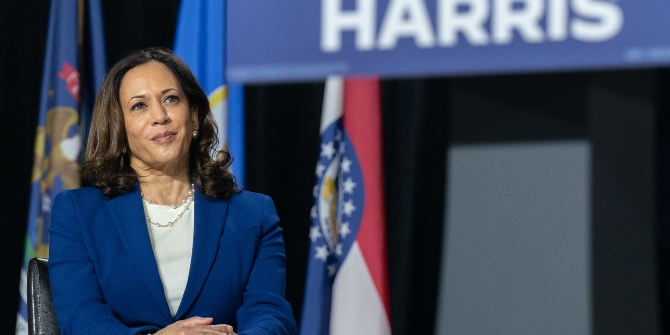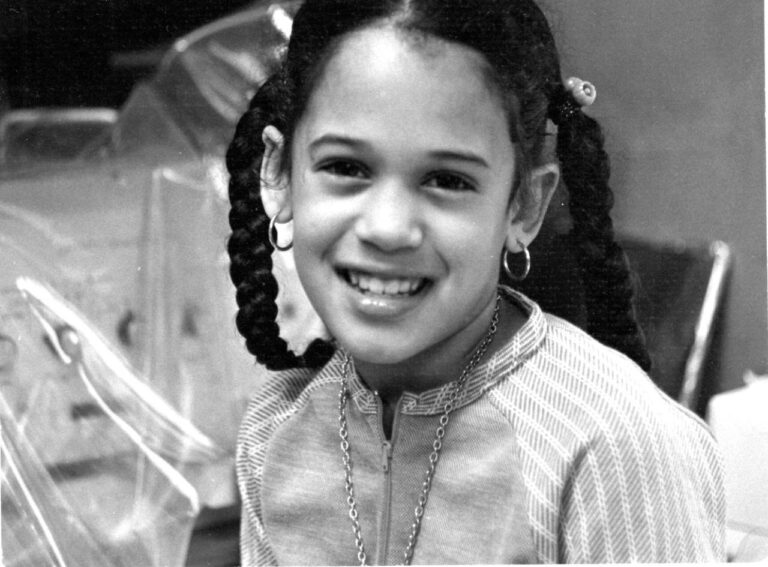“Reporters will ask me, what do you think about this whole question of ‘is America ready for you?’ What I tell them is, you know what? This is not a new conversation for me. I’ve heard this conversation every time I have — and now here’s the operative word — won. But every time, every time, I ran for these offices: They’re not ready for you. It’s not your turn. It’s not your time. Nobody like you has done this before. Oh, I think you’d be great, but I don’t think everybody else is ready. And I didn’t listen.” These were the words of Kamala Devi Harris at an event held in Nevada in October 2019, where she spoke on gender equity, while a Democratic presidential hopeful at the time.
 Obviously, she did not listen. Else, she would not have gone on to become the vice-president-elect of the United States.
Obviously, she did not listen. Else, she would not have gone on to become the vice-president-elect of the United States.
AMERICAN, ASIAN, AFRICAN?…LET’S TAKE A LOOK AT HARRIS’ MULTI-RACIAL ORIGIN
Harris was born on October 20, 1964, in Oakland, California to Shyamala Gopalan, a biologist, and Donald J. Harris, a Stanford University professor emeritus of economics. Gopalan arrived in the US from Tamil Nadu, India, in 1958 as a 19-year-old graduate student to pursue a doctorate in nutrition and endocrinology at Berkeley. Donald arrived in the US three years earlier from Jamaica for graduate study at UC Berkeley. The young couple met in 1962 and got married while still in school. They had Harris first and later, her sister, Maya — chairperson of Harris’ presidential campaign.
Gopalan and Donald separated after the latter took a professorship at the University of Wisconsin-Madison. Gopalan filed for divorce in December 1971, when Harris was seven and won custody of her daughters in June 1973.
Kamala Harris’ parents, Shyamala Gopalan and Donald Harris, with her as a baby. (Courtesy of Kamala Harris)
“They didn’t fight about money. The only thing they fought about was who got the books,” Harris wrote in her 2019 memoir, “The Truths We Hold”.
Harris told a virtual crowd at the 2020 Democratic National Convention that her parents “fell in love in that most American way — while marching together for justice in the civil rights movement of the 1960s”.
“My parents would bring me to protests — strapped tightly in my stroller,” she said in August, in her first public remarks after being named Biden’s running mate.
She wrote that her parents struggled with “incompatibility” and that she and her sister spent the bulk of their time with their mother, but would see her dad “on weekends and spend summers with him in Palo Alto”. Harris described her mother as the person with the most important influence on her life.
“Had they been a little older, a little more emotionally mature, maybe the marriage could have survived. But they were so young. My father was my mother’s first boyfriend,” she wrote.
FIRST OF HER KIND
“My mother used to say: ‘Don’t sit around and complain about things, do something,” Harris told her supporters at her kick-off rally in Oakland. Gopalan would also tell a young Harris that “you may be the first to do many things, but make sure you’re not the last.”
A breast cancer researcher who died of colon cancer in 2019, Gopalan would no doubt be proud of the daughter she birthed as Harris told The New Yorker in a 2019 interview that she was the first of her kind — gender and colour — to win every position she ran for.
“Here’s the thing: every office I’ve run for I was the first to win. First person of color. First woman. First woman of color. Every time.”
The exception to this feat is that Carol Moseley Braun, a Democrat from Illinois, was the first black woman elected to the senate in 1992. Harris is the second. She is, however, the first South-Asian senator elected into that position
She was the first African-American woman to serve as San Francisco’s district attorney, the first woman of colour to serve as her state’s attorney-general, and the first woman of colour to serve California in the US senate.
JOURNEY TO ATTORNEY-GENERAL
After studying political science and economics (1986) at Howard University, Harris earned a law degree (1989) from Hastings College. In 1990, Harris was hired as a deputy district attorney in Alameda County, California.
In February 1998, Terence Hallinan, San Francisco district attorney, recruited Harris as an assistant district attorney. She served as San Francisco’s district attorney from 2004 to 2011 and California’s attorney general from 2011 until 2017 — becoming the first female and the first African-American to hold the post.
ONCE BIDEN’S RIVAL, NOW HIS ‘PARTNER’
Harris announced her intention to run for president on the platform of the Democratic Party in January 2019. In the first 24 hours that followed, she reached a record set by Bernie Sanders in 2016 for the most donations raised in the day following an announcement. During the first Democratic presidential debate in June 2019, Harris scolded Biden for “hurtful” remarks he made, speaking fondly of senators who opposed integration efforts in the 1970s and working with them to oppose mandatory school busing. However, she ended her campaign in December 2019, citing a shortage of funds. Biden announced her as his running mate in August 2020.
‘AN INDIAN GODDESS’
A young Kamala Harris at her mother’s laboratory at UC Berkeley. (Courtesy of Kamala Harris)
Harris’ first name, Kamala, of Indian origin means “lotus” or “pale red” in Sanskrit. She may also have been named after Kamala, another name for Lakshmi, a popular Hindu goddess. Lakshmi is the Hindu goddess of prosperity, good luck, and beauty, and she’s often depicted with the lotus flower.
Her mother told the Los Angeles Times that: “A culture that worships goddesses produces strong women.”
On her Twitter bio, Harris describes herself as “Vice President-Elect of the United States. Senator, Wife, Momala, Auntie. Fighting for the people. She/her.”
She married Douglas Emhoff, a corporate lawyer in Los Angeles, in 2014 at a small and private ceremony officiated by her sister, and according to Harris, Cole and Ella, her husband’s children from his previous marriage call her Momala. She has no children of her own.
‘TOP COP’
Harris: “Life imprisonment without parole is better and more cost-effective punishment.”
As district attorney, Harris championed some progressive reforms in her home state, including instituting a programme in San Francisco that offered first-time drug offenders education and work opportunities instead of jail time. She has been criticised over her stance on the death penalty, but when Tulsi Gabbard, member of the US house representing Hawaii’s 2nd congressional district, accused her in 2019 of withholding key evidence that would have “freed an innocent man from death row” during her time serving as California attorney-general, Harris replied, saying: “My entire career I have been opposed — personally opposed — to the death penalty. And that has never changed.”
Harris said life imprisonment without parole is a better and more cost-effective punishment than the death penalty, and has estimated that the resultant cost savings could pay for 1,000 additional police officers in San Francisco alone.
As a senator, she has advocated healthcare reform, a path to citizenship for undocumented immigrants, the DREAM Act, a ban on assault weapons, and progressive tax reform.
AN INSPIRATION
Harris has shattered records and made history — but it is not just for herself. It is for all the blacks and young girls who look up to her.
“While I may be the first woman in this office, I won’t be the last,” Harris said in her victory speech on Saturday evening.
In 2005, she was featured along 19 other women in a Newsweek report profiling “20 of America’s Most Powerful Women”. In 2008, she was named as one of the 34 Attorneys of the Year by California Lawyer magazine. In 2010, California’s largest legal newspaper, The Daily Journal, designated Harris as one of the top 75 women litigators in the state, and one of the top 100 lawyers in the state. In 2013, Time named Harris as one of the “100 Most Influential People in the World”. In 2018, Harris was named the 2018 recipient of the ECOS Environmental Award for her leadership in environmental protection.
‘THE LITTLE THINGS’
 |
| Harris in her kitchen |
Beyond the rigours of her legal and political career, Harris is an enthusiastic cook who bookmarks recipes from the New York Times’ cooking section and has tried almost all the recipes from Alice Waters’ “The Art of Simple Food”. Her go-to dinner entree is a simple roast chicken.
Her favorite books include “Native Son” by Richard Wright, “The Kite Runner” by Khaled Hosseini, “The Joy Luck Club” by Amy Tan, “Song of Solomon” by Toni Morrison, and “The Lion, the Witch and the Wardrobe” by C.S. Lewis.
She typically wakes up around 6am and works out for half an hour. She starts her day with a bowl of Raisin Bran with almond milk and tea with honey and lemon before leaving for work.
 |
| Kamala and her husband |
“If I’ve had a particularly crazy day, I try to squeeze in a nice hot bath before I go to bed. And I have a hot cup of tea, usually some kind of chamomile. One of the things that I do to relax at the end of the day is I read recipes. I have a whole collection of cookbooks, so if I’m at home, I read them. It could be Marcella Hazan or Alice Waters. Sometimes I just do the New York Times cooking app if I’m on the road, or I try to get past the paywall on Bon Appétit,” Harris said, commenting on how she unwinds.






